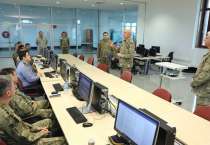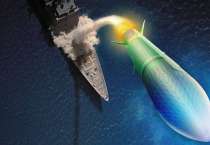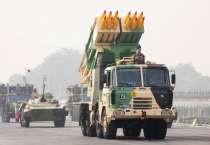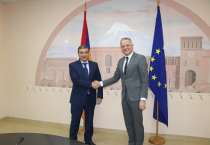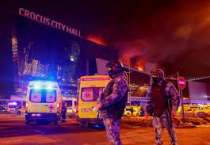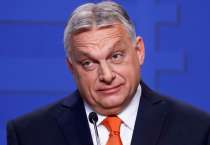US divisions over Putin’s Russia present grave global implications
USA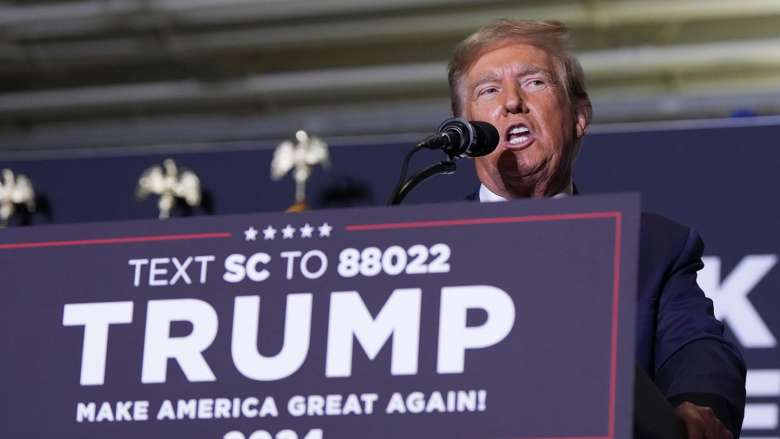
US politics is now split by a fault line over Russia that could have far graver global implications even than condemning Ukraine to defeat after President Vladimir Putin’s invasion.
The refusal of pro-Donald Trump Republicans in Congress to extend a military lifeline for Ukraine, and the former president’s return to attacking NATO allies in ways that align with Putin’s goals, show that Trump is already reshaping geopolitical realities months before his possible White House return.
Most immediately, enormous pressure is building on inexperienced House Speaker Mike Johnson – who would likely need to spurn the powerful Trump wing of the GOP and use Democratic votes to pass billions of dollars in Ukraine aid already endorsed by the Senate. Such a move could cost Johnson his job atop the tiny, fractious GOP majority.
But more broadly, the transformation of Republican foreign policy reflected in the showdown over Ukraine is stoking alarm about Trump’s longer-term intentions in any second term beyond Ukraine. This includes the possibility he could seek to quit NATO and thereby dismantle the post-World War II transatlantic security arrangements that won the Cold War and led to 80 years of peace in Europe.
The willingness of some GOP lawmakers to walk away from Ukraine and to excuse Trump’s berating of allies reflects shifting political forces in the US, partly dictated by the former president’s “America first” nationalism. But public sentiment has also been molded by an exhausting first two decades of the 21st Century, that were scarred by bloody wars abroad and several financial and domestic crises.
President Joe Biden has reacted to Trump’s recent rhetoric with disgust, framing it as a breach of America’s historic leadership role, and he laid blame with GOP lawmakers for recent Ukrainian battlefield reversals.
Biden also assured Zelensky of continuing US support ahead of the second anniversary of the invasion. But given hardening GOP sentiment against more aid, including the refusal by Johnson to bring a Senate-passed aid package up for a vote, that assurance that looks increasingly shaky.
And more broadly, if only one of America’s two governing parties fully opposes Russian expansionism and supports NATO security guarantees that have endured for decades, the US will forfeit its position as a bulwark of Western security, alarming its allies and offering multiple openings for adversaries in the Kremlin.
A Republican transformation
The transformation of the GOP – which once boasted of defeating the Soviet Union – has been highlighted by Trump’s failure to join the global outrage at the death of opposition hero Alexey Navalny. In a statement on Monday, Trump, the front-runner for the Republican presidential nomination, likened Putin’s brutal autocracy to America, drawing an apparent analogy between his own legal problems and the persecution dealt out to the courageous Russian dissident.
Trump has also not repudiated his recent comment that he’d invite Russia to invade NATO nations that fell short of non-binding targets on defense spending. He even trumpeted on Monday an endorsement from Hungary’s Viktor Orban, Putin’s closest ally in the European Union and an anti-democratic strongman.
Trump’s bizarre deference to Putin is not new – his genuflecting was a frequent theme of his presidency. But it is even more striking now, given the Russian leader’s status as an accused war criminal who launched an unprovoked invasion of a democratic neighbor. After propping up Ukraine for two years with billions of dollars in aid and ammunition, a US decision to walk away and leave it to Putin would represent a stunning change of course.
Aside from the mysterious hold that Putin appears to exert over Trump, the ex-president’s hostility towards Ukraine is easily explainable. Zelensky after all refused his entreaties to launch a criminal investigation against Biden before the 2020 election. The coercion campaign was at the heart of Trump’s first impeachment.
Opposing aid to Ukraine is also an almost perfect issue for the ex-president and his allies in the GOP primary. His opposition to arms and ammunition transfers as well as his criticism of NATO allies over their defense budgets plays into his core claim – dating right back to his 2016 campaign – that other countries are taking advantage of the United States.
Johnson is resisting demands from the White House to allow a vote on a bill that passed the Senate on a bipartisan basis, arguing that America can’t fix another nation’s borders before it fixes its own. This is an argument that strongly resonates with Republican voters. Many question why billions more dollars should be sent to Ukraine while they struggle with high grocery prices and interest rates and wonder why America isn’t taking care of its own first.
Ukraine badly needs arms and ammunition amid signs that momentum is shifting to Russia on the battlefield. This is likely to train even more scrutiny on a speaker who was a largely unknown figure when he was thrust into the job as a last resort candidate following Kevin McCarthy’s ouster last year. Johnson’s reputation hasn’t been helped by the House’s departure for a two-week recess while Ukrainian front-line soldiers ration bullets.
But even if Johnson can solve the short-term conundrum over this bill and the package ends up getting passed, America’s fraught election-year dynamics and a more nationalist, isolationist, Republican Party mean that prospects for long-term US bankrolling of Ukraine’s war look grim – given the expectation that whoever wins the presidential election, the country and Congress will remain closely divided.
A Republican message seen as a sign of appeasement in Munich
Several Republicans took their unwelcome message to the Munich Security Conference at the weekend.
Ohio Sen. JD Vance, a big Trump fan, argued that the current $60 billion US aid proposal for Ukraine “is not going to fundamentally change the reality on the battlefield.” He said the US doesn’t have the manufacturing capacity to pump out sufficient ammunition for Ukraine as well as its own needs. He called for a negotiated peace with Russia to end the war and complained there was no clear end game for US policy. And while he doesn’t favor pulling out of NATO, he said Europe must do more in its own defense as the US looks to China.
“I do not think that Vladimir Putin is an existential threat to Europe and to the extent that he is, again, that suggests that Europe has to take a more aggressive role in its own security,” Vance said.
The Ohio senator’s arguments paralleled those of multiple US presidents who have long griped that Europe should do more.
While NATO defense spending has been rising, only 18 of 31 alliance members are expected to reach a target of 2% of their GDP this year. Even those that do face questions about readiness and capacity. And Vance’s implication that the West will never be able muster the indefinite cash needed to prop up Ukraine is not outlandish. In 2016, two years after Russia’s annexation of Crimea, then-President Barack Obama told “The Atlantic” that Ukraine is “going to be vulnerable to military domination by Russia no matter what we do.”
Still, Vance’s contention that Putin would pose no existential threat to Europe is debatable, especially if the Russian leader’s aggression is rewarded in Ukraine. And there may be no end game in the war as Putin seems determined to stay engaged as long as it takes, and Ukraine is unlikely to accept any Russian guarantees under a negotiated peace deal.
Furthermore, when it comes to China, the Republican position that the US needs to make a deal with Russia so it can concentrate on East Asia seems naïve. Increasingly, links between Beijing, Moscow, Iran and North Korea mean the new geopolitical game is global. And there’s no reason to think Putin has any interest in forging stability in Europe so the US can turn to another foe.
Who will make an argument for NATO in future?
But Vance is part of a new generation of Republicans who represent a more nationalist and transactional brand of foreign policy – that is unlikely to change even when Trump is no longer their party’s dominant figure. For instance, former US ambassador to the United Nations Nikki Haley has been calling for a return to the hawkish foreign policy that dominated the GOP for decades. On Monday for instance, she accused Trump of going “weak in the knees” over Russia. But Haley trails Trump badly in the GOP primary race, and she often seems to be running for the leadership of a party that no longer exists.
Evolving foreign policy sentiments among GOP voters was highlighted in a new report by the Chicago Council on Global Affairs that found that a majority of Republicans think it would be best for the future of the US to stay out of – rather than take an active part in – world affairs. Pro-Trump Republicans were even more negative about the US having a global role.
These pressures weigh on Republican lawmakers as they cast increasingly tough votes on Ukraine aid.
The dilemma is encapsulated by Sen. Pete Ricketts, a Republican who supports more aid for Ukraine but voted against the package last week on the grounds that the US needed to do more to halt the flow of undocumented migrants coming across the border. Ricketts was also in Munich at the weekend, and tried to assure skeptical Europeans that, eventually, Congress would act on aid for Ukraine. He also summed up what could be at risk if Trump decides to neuter the Western alliance.
“I was talking to a mother at my state fair, (and) she said, ‘Senator, I don’t want my 18-year-old fighting in Europe,’” Ricketts recounted. “I said, ‘That’s why we’re giving Ukraine weapons. So that that doesn’t happen because if Ukraine loses, and Putin invades one of our NATO allies, then your 18-year-old will be fighting in Europe.’”
The Nebraska senator’s anecdote suggests Biden’s warnings on the importance of NATO aren’t getting through, more than 30 years after the fall of the Soviet Union.
It’s not surprising. Anyone with an adult memory of the importance of NATO in the tense years of the Cold War is now in their 50s at least. The Greatest Generation that fought World War II, that led to current transatlantic security structures, has now mostly passed on.
There’s a glaring need for leaders in the US and Europe who are younger than Biden and 82-year-old Senate Republican leader Mitch McConnell, who helped steer Ukraine aid through the chamber, to make the case for NATO’s role in keeping the peace.
If they don’t, opportunists like Trump will continue to take advantage.





 Pashinyan, Putin to address all issues on bilateral and multilateral agenda
Pashinyan, Putin to address all issues on bilateral and multilateral agenda Putin inaugurated for fifth term as Russian president
Putin inaugurated for fifth term as Russian president Russia will conduct exercises with non-strategic nuclear weapons
Russia will conduct exercises with non-strategic nuclear weapons Invitation to Putin's inauguration received, decision on participation not made yet: Stano
Invitation to Putin's inauguration received, decision on participation not made yet: Stano Pashinyan will not attend Putin's inauguration, Armenia parliament speaker says
Pashinyan will not attend Putin's inauguration, Armenia parliament speaker says Pashinyan will not attend Putin's inauguration, Armenia parliament speaker says
Pashinyan will not attend Putin's inauguration, Armenia parliament speaker says Ukraine facing 'new stage' in war as Russia preparing to expand offensive: Zelensky
Ukraine facing 'new stage' in war as Russia preparing to expand offensive: Zelensky Cameron says Kyiv can use British weapons inside Russia, Kremlin reacts
Cameron says Kyiv can use British weapons inside Russia, Kremlin reacts MediaHub: Armenia's Pashinyan to not attend Putin's inauguration
MediaHub: Armenia's Pashinyan to not attend Putin's inauguration Global wine production reaches lowest level in 62 years
Global wine production reaches lowest level in 62 years


















































 Most Popular
Most Popular 
 Jeep Grand Cherokee to no longer have V-twin engines
Jeep Grand Cherokee to no longer have V-twin engines

